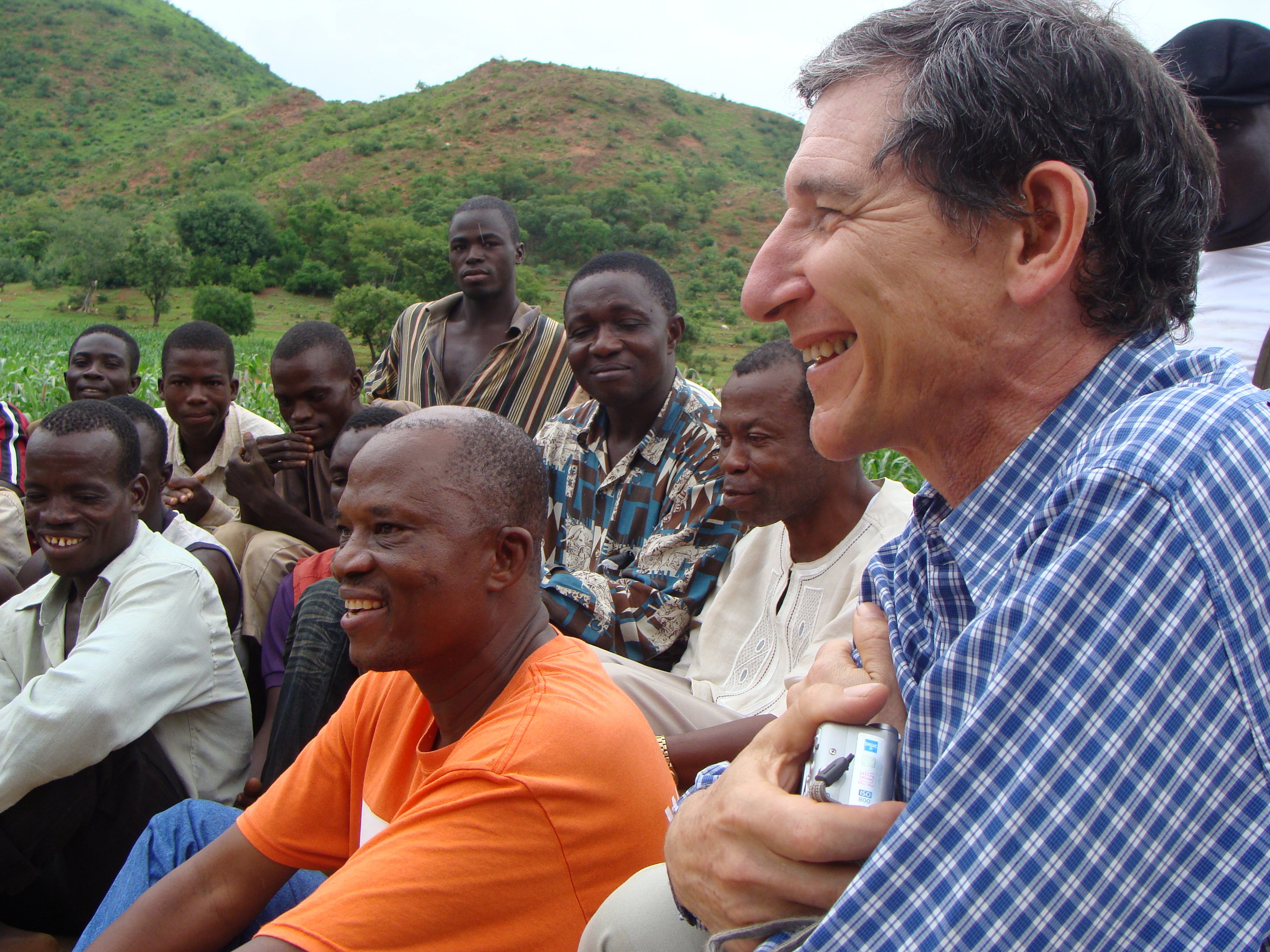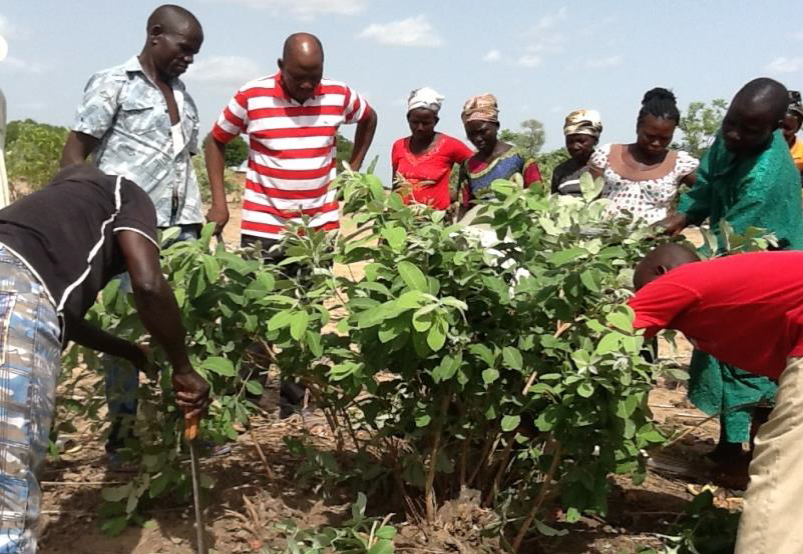
Movement for Natural Regeneration (MONAR) celebrates its first birthday!
March 31, 2016
MONAR is a Ghanaian organisation dedicated to teaching tree and land regeneration techniques to communities in West Africa. Norbert Akolbila founded MONAR after learning about Farmer Managed Natural Regeneration through his time working for World Vision Ghana. He has worked with FMNR pioneer Tony Rinaudo for many years. Here is what Tony had to say about Norbert and his organisation
“My impressions of Norbert when I first met him in 2009 were that here was a rare individual who was still passionate and loved his work and the people he served even after more than a decade of service. Many people take time to grasp the simplicity and power of FMNR. Not Norbert. He was a convert from day one and his skill and infectious enthusiasm planted the seeds of change in Ghana’s Upper East Region which is literally changing its history for the better, when one considers the trajectory of land degradation and poverty that prevailed previously. The words of Chief of Yameriga, Yamdaan Zimbil Longmoare “This gift of FMNR is from the Almighty God and therefore anywhere you visit you bring life and joy” hold firm for Norbert.”
Introducing the Movement for Natural Regeneration (MONAR)
Mission Statement
MONAR preserves and restores the productivity of degraded arid lands through natural regeneration, land restoration and re-vegetation for sustainable community livelihoods.
Vision
To improve livelihoods and promote sustainable development through land restoration and re-vegetation.
History
The Movement for Natural Regeneration (MONAR) is an environmental Non-governmental Organization (NGO) based in Bolgatanga of Northern Ghana. MONAR was founded by Mr. Norbert Baba Akolbila in 2014, out of his passion for natural regeneration of trees. Norbert developed the passion from his work with World Vision Ghana (WVG) in the Talensi-Nabdam District of the Upper East Region, where a Farmer Managed Natural Regeneration (FMNR) Project was piloted from 2009 to 2011 with support from World Vision Australia. So convinced was Norbert of the value of FMNR that he turned his back on a secure income and resigned from WVG in January 2014 after 16 years of service as a Development Facilitator and Programme Manager.
Approach
MONAR’s approach is to promote the widespread adoption of Farmer Managed Natural Regeneration (FMNR) as a simple and cost effective technique for the restoration & re-vegetation of degraded lands in the communities that they work in. They do this through social mobilisation, advocacy and nurturing genuine partnership. MONAR is commitment towards building partnerships with local communities, government and non-government agencies and other civil society organization; and then building the financial and human resources within our organization as needed to meet the changing times.

Results
MONAR have had a fantastic year, and many success stories can be found within their annual report. Here is an example of the work they have been doing with communities
The philosophy of MONAR‟s community mobilisation and sensitization approach is bringing all community stakeholders together towards environmental sustainability for restoring community livelihoods. An Ethiopian proverb aptly says that – “when spider webs unite they can tie up a lion”. Following the initial interactions with the administrative and traditional leadership structures in the Bongo District, MONAR visited the Ayopia community, which was identified as having a suitable site for piloting FMNR in the District, to interact with community stakeholders. The aim was to get inclusive community participation and buy-in of the people regarding the practical benefits of FMNR. The more community people are informed about and involved in the regeneration and land restoration process, the more likely that FMNR initiatives will succeed. Without community involvement (buy-in), an FMNR project may never take-off the ground or risked being short-lived. The initial visits were to create awareness among key local stakeholders (community chief and elders, women’s groups, men, children and the youth) on the importance of using FMNR for environmental protection and livelihoods improvement. We engaged with the community leaders in discussions regarding tree management rights and responsibilities. We needed to recruit women in particular from the onset in order to use their networks for community mobilisation and collective action around natural regeneration
The Community leaders (Chief and Assemblyman) welcomed the idea and quickly organised a general community meeting during which MONAR was invited to share the prospects and benefits of FMNR with the people. During the meeting, MONAR Executive Director (Norbert Akolbila) explained the long-term multiple benefits of FMNR and similar land management techniques. He said the benefits of FMNR include; trees reducing wind speed, the shade provided by trees reduces temperatures and limits evaporation, certain tree species like Faidherbia albida (zanga) improving soil fertility and at the same time producing feed for livestock, trees like shea and baobab providing fruits and leaves of high nutrition value for local people, trees improving household food security because they create more complex and productive farming systems that are also more resilient to drought, and trees increasing overall agricultural production, thus playing a role in the reduction of rural poverty in local communities.
The community meeting was followed by a night education session on FMNR in the community. Under the bright moonlight, complemented by power supplied by a Generator, the MONAR team showed FMNR videos and pictorial PowerPoint presentations aimed at drawing attention to local environmental degradation issues for discussion. More than 600 community members made up of men, women and children including the Chief and Assemblyman for the area attended the programme. The community selected 20 FMNR pilot farmers made up of 10 women and 10 men, who were inaugurated after the sensitization session.
The selected pilot farmer volunteers have been trained on proper pruning techniques of trees and shrubs to enable them begin trying FMNR on their farm fields. Facilitating the training, Norbert explained that the objective of pruning is to produce strong, healthy and attractive plants. He told the farmers that by understanding how, when and why to prune, and by following a few simple principles, they could successfully regenerate useful trees on their fields alongside the cultivation of food crops.
So far, an approximately 10 hectare pilot field in the community (Ayopia) has been pruned and red flags hoisted at vantage points to warn potential encroachers.
To read more about MONAR’s approach to FMNR click here to view their annual report
